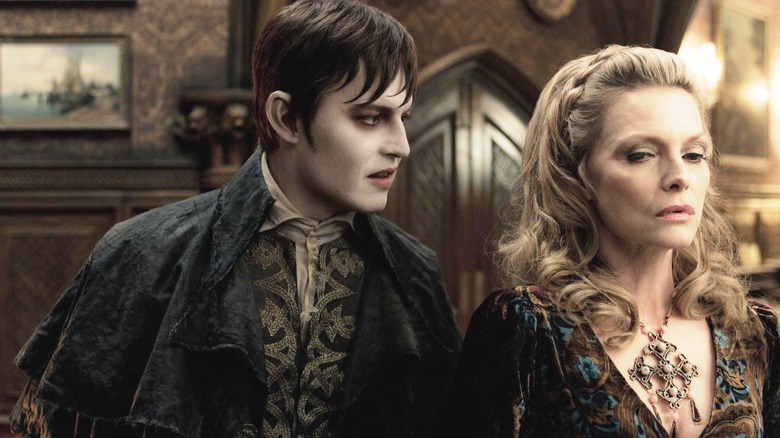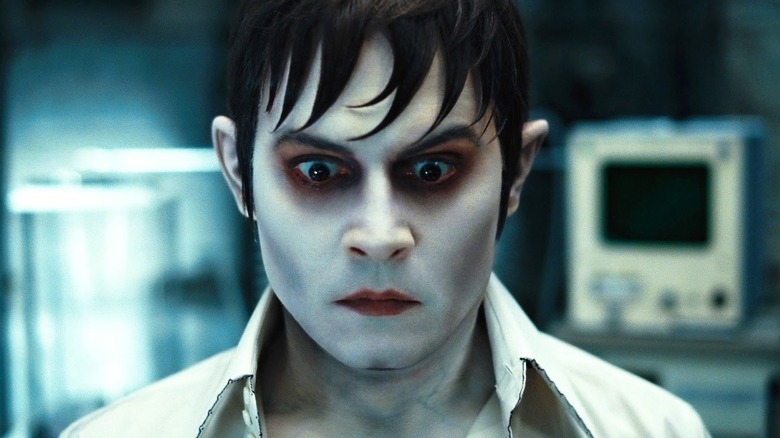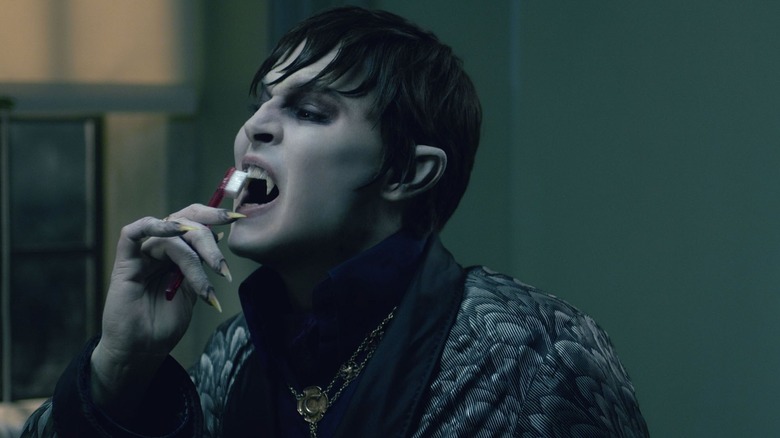The Dysfunctional 60s Show Johnny Depp Tried To Resurrect
In a 1996 episode of "This American Life," host Ira Glass was introduced to the vast, near-incomprehensible world of "Dark Shadows" for the first time. "Dark Shadows," for those who don't know, is a Gothic, vampire-forward soap opera that ran on ABC from 1966 to 1971, lasting six seasons and, no lie, 1,225 episodes. Because it was a daily program, the showrunners had to work at a breakneck pace, often committing grievous technical errors along the way. Those errors, however, were the central appeal for the world's many "Dark Shadows" fans. Glass likened it to tuning into car races just to see crashes. There is verisimilitude to such a concentration of human error.
Then, Glass is told by a "Dark Shadows" fan, that words like "groovy" began working their way into the show's dialogue sometime in the 1969 season. "Dark Shadows" is deeply beloved, partly for its complex, vampiric storylines, but just as much for its cheap camp. The show was put into syndication, and '90s Gen-Xers — at least the ones who had the wherewithal to seek it out — fell in love with its Goth sensibilities and goofy campiness.
"Dark Shadows" was revived in 1991 as an hour-long weekly primetime series, although that version only lasted 12 episodes. Then in 2004, The WB put out a new version of "Dark Shadows," but it never made it past the pilot episode.
In 2012, director Tim Burton directed a feature film "spoof" version of "Dark Shadows" that turned the vampire soap opera into a near-slapstick farce. The film starred Johnny Depp as the central vampire, Barnabas Collins, a ghoul buried in the 1760s and awakened in 1972.
It wasn't well-received, boasting only a 35% approval rating on Rotten Tomatoes.
A pity, as the 2012 film is rather enjoyable.
The comedy version of 'Dark Shadows'
Not only was "Dark Shadows" only middlingly reviewed, but audiences rejected it. On a budget of $150 million (!), the film only grossed $79 million domestically, a considerable bomb in Hollywood. "Dark Shadows" would also make an additional $165 million internationally, but there wasn't enough audience goodwill to warrant a sequel. No legion of defenders has stepped forward to rescue the reputation of "Dark Shadows" (an increasingly unlikely endeavor in 2024).
Burton's film, however, is a hoot. Its premise is a little broad — the vampire-out-of-water humor wasn't exactly fresh — but its stylish execution reveals both a deep love and a gentle ribbing of the original soap opera that many audiences, perhaps, didn't necessarily register.
The story of the film follows the series up to a point. In the 1760s, at the wealthy Collinwood estate, Barnabas is engaged to Josette (Bella Heathcote) but is having an affair with the witch Angelique (Eva Green). When Barnabas spurns Angelique, she kills his parents, hypnotizes Josette into walking off a cliff, and transforms Barnabas into an immortal vampire. She then assembles the whole town to attack Barnabas and bury him alive.
He remains buried until 1972, awakening to a world that says "groovy" a lot. One can instantly see Burton's homage to the above-mentioned hippie language that leaked its way into the original show.
In 1972, Barnabas returns to Collinwood to find his descendants living there. The family is now a gaggle of decaying recluses who have long been rejected by the town and behave ... very oddly. Burton stages early conversations between Barnabas and the family matriarch Elizabeth (Michelle Pfeiffer) with deliberate staginess, making sure their footfalls are a little too loud, and their dialogue a little stilted. This was an homage to the cheapness of the original show.
Fangs for nothing
The cast of Burton's "Dark Shadows" was vast and impressive. In addition to Depp, Pfeiffer, Green, and Heathcote, Johnny Lee Miller played the weak-chinned brat Roger, Helena Bonham Carter played the family's live-in shrink, Jackie Earle Haley played the suspicious caretaker, and Chloë Grace Moretz played the eternally annoyed '70s teen ... who is also a werewolf.
The problem with satirizing/paying homage to a clunky, shabby series like "Dark Shadows" is that audiences have to be in the know. In 2012, "Dark Shadows" was largely obscure (outside of a kooky segment of camp-loving Gen-Xers), and many might not have known the show's reputation for mistakes and low production values. Hence, when Burton staged a scene with stiff dialogue, overacting, and awkwardly delivered plot revelations, many simply assumed he was directing poorly. Only those who loved "Dark Shadows" for its cracks and errors giggled at Burton's obvious spoofery.
/Film has defended it in the past.
The release of "Dark Shadows" didn't inspire many to seek out the original series, and it didn't return to TV for a celebration. One can, however, buy a DVD box set of the original series on the second-hand market. It's presented on 131 DVDs.
The cultural value of "Dark Shadows" continued to linger after the failure of Burton's film, though, and in 2019, Mark B. Perry announced that he was working on "Dark Shadows: Reincarnation" for The CW. The announcement was made to Deadline five years ago, but the project has seemingly stalled. In 2021, Perry announced that he was still interested and that he was shopping the revived "Dark Shadows" to other networks.
It's possible that the unpopularity of the Depp/Burton film, however, is keeping Barnabas from rising again. For now, it seems that fans would prefer the show stay buried.


